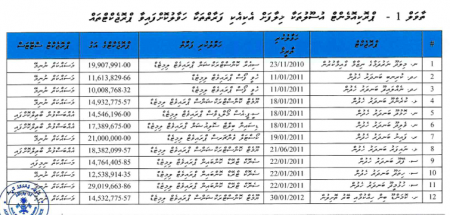Yesterday’s parliamentary elections were well-administered and transparent “but wider issues of money politics threatens to hijack [the] democratic process,” NGO Transparency Maldives (TM) has said in its preliminary statement on the Majlis polls.
TM revealed that a survey conducted prior to last year’s presidential election showed that 15 percent of respondents had been offered “money or other incentives” in exchange for their vote.
“Admissions about illegal activities such as this are usually underreported in surveys. TM’s long-term observation indicates that vote buying may be even more widespread in the parliamentary elections than other elections,” the statement read.
“Inability of state institutions to prosecute vote buying due to gaps in the electoral legal framework, lack of coordination, and buck-passing between the relevant institutions have allowed rampant vote buying to go unchecked.”
The NGO recommended that vote buying should be monitored, investigated and prosecuted “through implementation of the existing legal provisions” in addition to parliament considering “urgent reforms to the laws to better address the issue.”
While voting was ongoing yesterday, police arrested an individual near a polling station for allegedly distributing cash.
Police also revealed two days before the polls that it was increasingly receiving reports of vote buying.
Cash and gifts were allegedly being handed out on behalf of candidates for parliament, police said.
Meanwhile, speaking at a press conference today, Tourism Minister Ahmed Adeeb – deputy leader of the ruling Progressive Party of Maldives – categorically denied allegations that candidates representing the Progressive Coalition bought votes.
Coalition supporters have submitted complaints “with photo and video as proof” to the Elections Commission (EC) about the opposition Maldivian Democratic Party distributing cash for votes, Adeeb alleged.
Campaign finance reform
TM also noted a lack of transparency in political and campaign financing ahead of elections, which was exacerbated by “deep flaws in the standards, practices and poor oversight”.
“When political parties and individual candidates do not fully disclose where they get their money from, it is not clear who funds them, what their potential conflict of interests are, and, thereby allows vested interests to override public interest when elected as MPs,” TM observed.
It added that Transparency International’s Global Corruption Barometer surveys for the Maldives “continue to indicate a crisis of public trust in the parliament.”
“Increasing campaign financing transparency in parliamentary elections is crucial to hold parliamentarians to account, in order to prevent the hijack of the institution by vested interests and regain public trust in the parliament,” the statement read.
In addition to identifying and addressing “the gaps in the electoral legal framework,” the NGO recommended “implementation of existing provisions to facilitate public scrutiny, ensure periodic reporting and an effective oversight mechanism for political finance.”
Among other issues that the NGO highlighted included the abuse of state resources “by successive regimes,” which allows campaigning on public funds, and lack of effective longterm voter and civic education.
TM also noted “uncertainties arising from the role of the judiciary in elections,” suggesting that the 16-point guideline imposed on the EC by the Supreme Court last year did not “improve upon the technical aspects of the election”.
Polling
TM observed that yesterday’s polls were peaceful, transparent and generally well-administered “with just one reported incident of violence inside a polling station.”
Among the NGO’s key findings from its observation of the voting process, TM noted that 83.52 percent of polling stations closed within the first hour of the normal closing time of 4:00pm and that the eligible voter registry was “overall very clean, with a very few cases where people were not able to vote because their names were not on the voter registry or their details did not match.”
Candidates from the opposition MDP were represented at 89.4 percent of polling stations and coalition parties at 88.8 percent, the statement noted.
“Unresolved disputes were reported at only 5.3 percent ballot boxes at the time of announcing results,” it added.
TM noted that voting was temporarily halted in 2.4 percent of polling stations, of which 75 percent were “interventions at the direction of the Presiding Officer while 25 percent were interventions by an unruly voter.”
“We note that the police entered 12.35 percent of polling stations. However, in 100 percent of such cases, interventions occurred at the invitation of the Presiding Officer as the rules allow.”
Meanwhile, according to the EC, a total of 115 complaints were submitted in writing to the national complaints bureau, including 18 concerning the voter registry and 33 complaints regarding negative campaigning, behaviour of election officials, and campaigning during polling hours.
In addition, 59 complaints were made via telephone, EC member Ali Mohamed Manik revealed at a press conference last night.
Manik explained that the complaints would be addressed before preliminary results are announced today.


